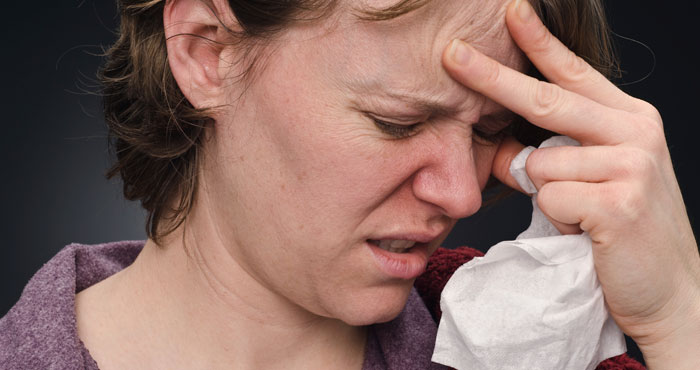How Long Does a Sinus Infection Last?

A sinus infection is a condition in which fluid builds up in your nasal cavities (small openings in your skull that are typically filled with air), an infection develops, and the lining of the sinuses becomes inflamed. Also called sinusitis or rhinosinusitis, it is most often caused by a virus but can also be caused by bacteria.
Several factors increase your risk of getting a sinus infection, including a recent cold, seasonal allergies, structural problems with your sinuses like growths called nasal polyps, smoking or exposure to secondhand smoke, and a weak or weakened immune system.
Symptoms of a sinus infection include:
- Runny and/or stuffy nose
- Facial pressure of pain
- Headache
- Sore throat
- Cough
- Thick, discolored mucus
- Post-nasal drip (mucus that runs down your throat)
- Bad breath
If what seem to be cold-like symptoms last longer than you might expect, that extended duration can be a sign of a sinus infection.
Chronic vs. Acute Sinus Infections
There are four general types of sinus infections. They are:
- Acute sinusitis. Acute sinusitis lasts less than 4 weeks. It often occurs as part of a cold or other respiratory illness.
- Subacute sinusitis. This type of sinus infection lasts 4 to 12 weeks.
- Recurrent acute sinusitis. If you have sinus infections that return 4 or more times a year and last 7 days or more, they are considered recurrent acute sinusitis.
- Chronic sinusitis. This type of infection lasts more than 12 weeks or continues to recur.
Find the Care You Need, Without the Guess Work
With a few simple clicks, determine the care options that are available and best-suited for you based on your reported symptoms and current location. It’s convenient. It’s accurate. It’s Care Finder. Get started today.
Preventing Sinus Infections
The best way to prevent sinus infections is to stay as healthy as possible, especially regarding respiratory illnesses. This includes getting recommended vaccines — flu, pneumococcal, COVID-19, etc. You should also wash your hands regularly, especially after being in public places, and avoid people who are sick with respiratory tract infections.
If you smoke, stopping reduces your sinus infection risk and the risk of those around you. And once you understand what a sinus infection feels like, taking action like performing nasal rinses as soon as you believe you have one supports symptom relief and faster healing.
Treating Sinus Infections
If your doctor believes your sinusitis is bacterial, they may prescribe an antibiotic. If you have viral sinusitis, antibiotics won’t work on the infection. However, there are other steps you can take to address the infection and symptoms.
For example, you can perform nasal irrigation (with a neti pot, for instance) to wash mucus out of the sinuses, which can promote healing. You can also take over-the-counter and prescription medicines as directed, including painkillers, decongestants, allergy medications, and steroids.
Drinking plenty of fluids can help thin your mucus and reduce blockages. You can also use a humidifier in the rooms where you spend most of your time. In addition, you should reduce your alcohol consumption, as it can worsen swelling of the nasal membranes.
Dealing with Recurring or Severe Sinus Infections
If you have frequent and/or long-lasting sinus infections, your doctor may prescribe imaging tests to determine the cause of your problem. If appropriate, a surgeon can remove blockages and enlarge the sinus passages to help the sinuses drain more easily. Better drainage can make it less likely that a sinus infection will develop.
If you suffer from recurring sinus infections or infections that linger, talk with your Baptist Health physician about your symptoms and the best treatments for you. If you don’t have a doctor, you can find one in our online provider directory.
Next Steps and Useful Resources
Find a Provider
Stuffy Nose or Sinusitis?
Are Humidifiers Good For Allergies & Asthma?
How to Tell the Difference Between a Cold and Allergies



